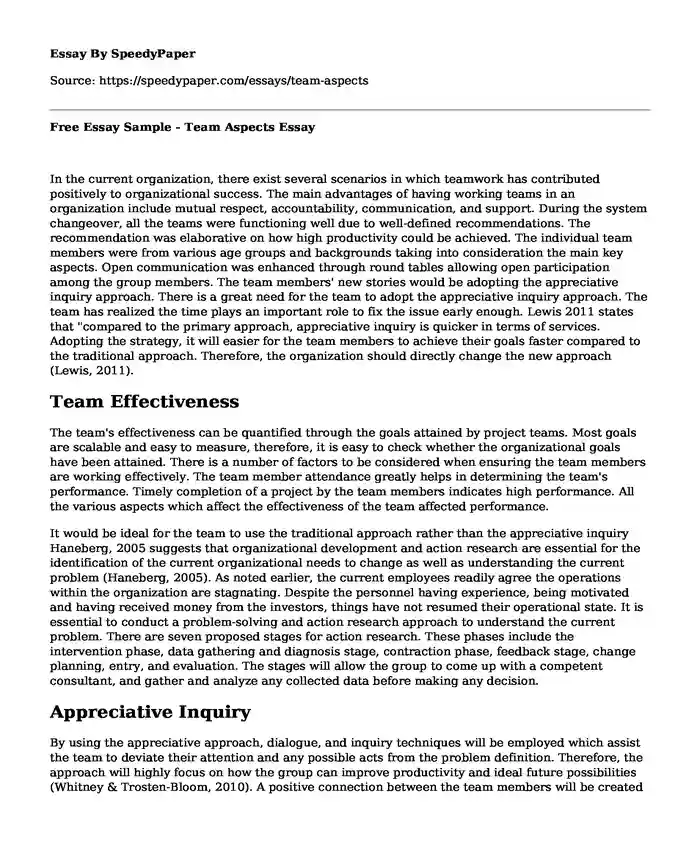
| Type of paper: | Essay |
| Categories: | Goal Organizational behavior Communication skills |
| Pages: | 3 |
| Wordcount: | 694 words |
In the current organization, there exist several scenarios in which teamwork has contributed positively to organizational success. The main advantages of having working teams in an organization include mutual respect, accountability, communication, and support. During the system changeover, all the teams were functioning well due to well-defined recommendations. The recommendation was elaborative on how high productivity could be achieved. The individual team members were from various age groups and backgrounds taking into consideration the main key aspects. Open communication was enhanced through round tables allowing open participation among the group members. The team members' new stories would be adopting the appreciative inquiry approach. There is a great need for the team to adopt the appreciative inquiry approach. The team has realized the time plays an important role to fix the issue early enough. Lewis 2011 states that "compared to the primary approach, appreciative inquiry is quicker in terms of services. Adopting the strategy, it will easier for the team members to achieve their goals faster compared to the traditional approach. Therefore, the organization should directly change the new approach (Lewis, 2011).
Team Effectiveness
The team's effectiveness can be quantified through the goals attained by project teams. Most goals are scalable and easy to measure, therefore, it is easy to check whether the organizational goals have been attained. There is a number of factors to be considered when ensuring the team members are working effectively. The team member attendance greatly helps in determining the team's performance. Timely completion of a project by the team members indicates high performance. All the various aspects which affect the effectiveness of the team affected performance.
It would be ideal for the team to use the traditional approach rather than the appreciative inquiry Haneberg, 2005 suggests that organizational development and action research are essential for the identification of the current organizational needs to change as well as understanding the current problem (Haneberg, 2005). As noted earlier, the current employees readily agree the operations within the organization are stagnating. Despite the personnel having experience, being motivated and having received money from the investors, things have not resumed their operational state. It is essential to conduct a problem-solving and action research approach to understand the current problem. There are seven proposed stages for action research. These phases include the intervention phase, data gathering and diagnosis stage, contraction phase, feedback stage, change planning, entry, and evaluation. The stages will allow the group to come up with a competent consultant, and gather and analyze any collected data before making any decision.
Appreciative Inquiry
By using the appreciative approach, dialogue, and inquiry techniques will be employed which assist the team to deviate their attention and any possible acts from the problem definition. Therefore, the approach will highly focus on how the group can improve productivity and ideal future possibilities (Whitney & Trosten-Bloom, 2010). A positive connection between the team members will be created through the use of dialogue. In order to hire a consultant in the organization, the traditional approach will be highly preferred compared to the appreciative approach. The consultant ensures all the participants are engaged in a direct interview process to gain information on how to improve the general team performance. The consultant then collects the main ideas from the team members before designing the major vision guide on how the team should operate.
References
Haneberg, L. (2005). Chapter 3: The action research approach to change. Organization Development Basics. Alexandria, VA: American Society for Training & Development. [EBSCO eBook Business Collection] retrieved from https://www.worldcat.org/title/organization-development-basics/oclc/502941355
Lewis, S., Cantore, S., & Passmore, J. (2011). Chapter 4: Appreciative Inquiry: How do you do it? Appreciative Inquiry for Change Management: Using AI to Facilitate Organizational Development. London: Kogan Page. [EBSCO eBook Business Collection] retrieved from https://www.researchgate.net/publication/303373207_Appreciative_Inquiry_for_Change_Management_Using_AI_to_facilitate_Organizational_Development
McLean, G. N. (2006). Chapter 1: What is organization development? Organization Development: Principles, Processes, Performance. San Francisco: Berrett-Koehler Publishers. [EBSCO eBook Business Collection]. Retrieved from https://www.bkconnection.com/static/mcleanexcerpt.pdf
Whitney, D. K., & Trosten-Bloom, A. (2010). Chapter 1: What is Appreciative Inquiry? The Power of Appreciative Inquiry: A Practical Guide to Positive Change. San Francisco: Berrett-Koehler Publishers. [EBSCO eBook Business Collection] retrieved from https://positivechange.org/the-power-of-appreciative-inquiry/
Cite this page
Free Essay Sample - Team Aspects. (2023, Mar 23). Retrieved from https://speedypaper.net/essays/team-aspects
Request Removal
If you are the original author of this essay and no longer wish to have it published on the SpeedyPaper website, please click below to request its removal:
- Free Essay Example on Television and Addiction
- Literary Essay Sample: The Things They Carried by Tim O'Brien
- Essay Example: Theoretical Review of the Credit Management
- Difference Between Quality Improvement Project and Research
- Article Analysis Essay on 'Why Chinese Mothers Are Superior' by Amy Chua
- Essay Example: PH Needs Assessments
- Free Essay Example. The Book of Psalms
Popular categories




